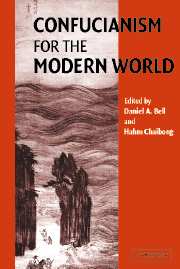Book contents
- Frontmatter
- Contents
- List of Contributing Authors
- Acknowledgments
- Editors' Note
- Introduction: The Contemporary Relevance of Confucianism
- PART I CONFUCIAN PERSPECTIVES ON DEMOCRACY
- 1 Constitutionalism, Confucian Civic Virtue, and Ritual Propriety
- 2 The Challenge of Accountability: Implications of the Censorate
- 3 Confucian Democrats in Chinese History
- 4 Mutual Help and Democracy in Korea
- 5 A Pragmatist Understanding of Confucian Democracy
- 6 The Case for Moral Education
- PART II CONFUCIAN PERSPECTIVES ON CAPITALISM
- PART III CONFUCIAN PERSPECTIVES ON LAW
- Epilogue: Why Confucius Now?
- Index
4 - Mutual Help and Democracy in Korea
Published online by Cambridge University Press: 28 August 2009
- Frontmatter
- Contents
- List of Contributing Authors
- Acknowledgments
- Editors' Note
- Introduction: The Contemporary Relevance of Confucianism
- PART I CONFUCIAN PERSPECTIVES ON DEMOCRACY
- 1 Constitutionalism, Confucian Civic Virtue, and Ritual Propriety
- 2 The Challenge of Accountability: Implications of the Censorate
- 3 Confucian Democrats in Chinese History
- 4 Mutual Help and Democracy in Korea
- 5 A Pragmatist Understanding of Confucian Democracy
- 6 The Case for Moral Education
- PART II CONFUCIAN PERSPECTIVES ON CAPITALISM
- PART III CONFUCIAN PERSPECTIVES ON LAW
- Epilogue: Why Confucius Now?
- Index
Summary
INTRODUCTION
The political scientist Juan Linz considers it a fact that “There is no alternative to democracy as a principle of legitimacy.” The Nobel Laureate economist Amartya Sen goes one step further in claiming that “this recognition of democracy as a universally relevant system, which moves in the direction of its acceptance as a universal value, is a major revolution in thinking, and one of the main contributions of the twentieth century.” He then reminds us that “we do not have to establish afresh, each time, whether such and such a country is ‘fit for democracy’ ” (1999: 5). Such an observation is rather reassuring to those of us whose interest in democracy is more than academic. Democracy in South Korea is likely to stay. It is comforting to hear President Kim Dae Jung say, in response to Lee Kuan Yew's now famous (or infamous) claim “culture is destiny,” that “democracy is destiny.”
It is the burden of this essay to demonstrate how Kim's claim is plausible despite a political climate which has not been congenial to democracy. In doing so, I will not, however, search for pointers in Korean traditional values that are compatible with democracy, as Sen insists that we do.
- Type
- Chapter
- Information
- Confucianism for the Modern World , pp. 90 - 123Publisher: Cambridge University PressPrint publication year: 2003



